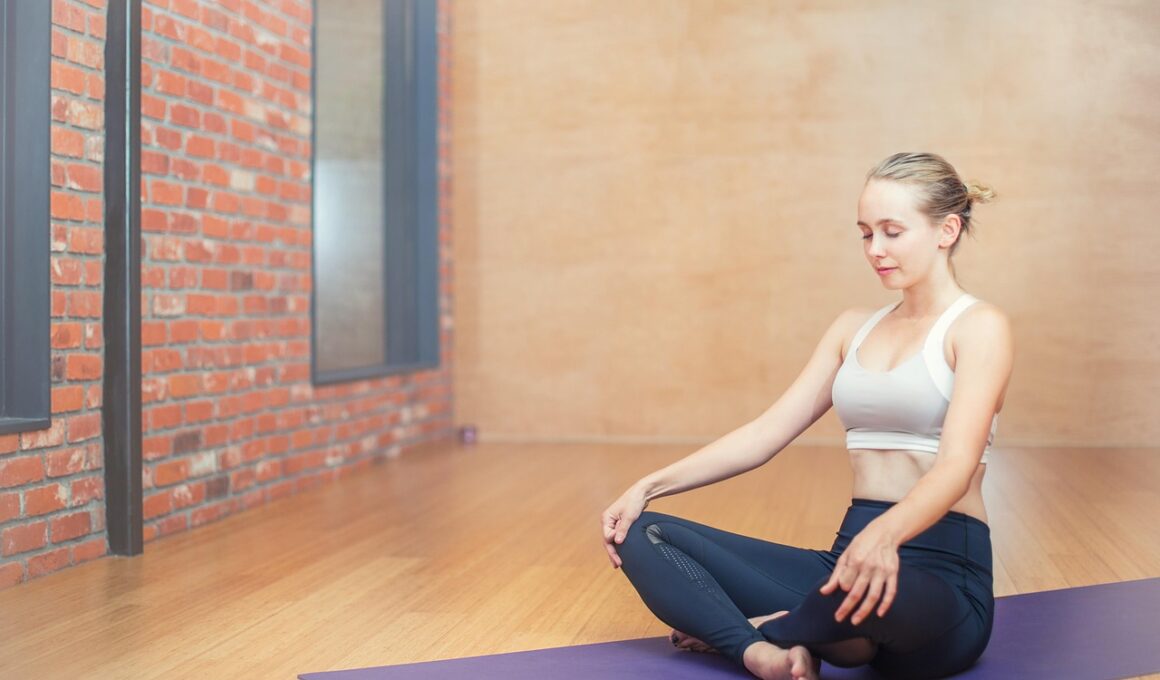Yoga and Meditation for Stress Relief in Chronic Conditions
Managing stress effectively is crucial for individuals dealing with chronic illness. Stress exacerbates physical ailments, leading to decreased well-being. Incorporating yoga into daily routines provides an effective mechanism for stress reduction. Yoga combines physical postures, breathing exercises, and mindfulness to promote relaxation. The combination of these elements helps in decreasing stress levels significantly. Additionally, meditation complements yoga by enhancing mental clarity and emotional stability. Mindfulness practices enable individuals to stay grounded in the present moment, alleviating anxiety. Through consistent practice, yoga can improve both physical and emotional health. While engaging in yoga, individuals often experience immediate relief through deep stretching and controlled breathing. Incorporating these techniques might result in heightened energy levels and improved overall mood. Practitioners often report feeling empowered to handle their chronic conditions effectively. Consequently, achieving balance through yoga not only uplifts spirits but also fosters a sense of self-efficacy. Moreover, engaging with a supportive community during classes can provide emotional support, enhancing motivation. Embracing this holistic approach enables individuals to navigate the challenges of chronic stress and illness more effectively.
The Physical Benefits of Yoga
Many chronic conditions can benefit from the physical aspects of yoga practice. Specific poses enhance flexibility, strength, and balance, improving bodily function. Regular practice can lead to reduced inflammation and enhanced immune response. Positions like downward-facing dog and child’s pose promote blood circulation, facilitating healing in the body. Furthermore, yoga encourages mindfulness during movement, which helps decrease impulsivity and promotes a balanced lifestyle. Working with a certified instructor ensures proper technique, preventing injuries and maximizing benefits. Stress-driven muscle tension often leads to discomfort, but yoga teaches relaxation techniques that release this tension. Incorporating breathwork into yoga practice enhances oxygen flow to muscles, calming the nervous system effectively. Moreover, the meditative aspect allows individuals to connect mentally and emotionally with their bodies. This connection often leads to greater awareness of physical sensations, fostering self-acceptance. As individuals grow more aware, they can better manage their chronic conditions. Many individuals report experiencing less pain and discomfort after establishing a regular practice. Additionally, improved posture resulting from yoga leads to enhanced overall wellness and vitality. Practitioners consistently report finding joy in movement, significantly improving their quality of life.
Yoga and meditation consist of numerous techniques suitable for stress management. These techniques cater to diverse individual needs, enabling everyone to discover what works best for them. Different styles offer a variety of practices, from restorative to vigorous types. Individuals can explore gentle sequences that focus on stretching and relaxation, or dynamic flows that build strength. Popular forms such as Hatha and Vinyasa yoga cater to various levels of experience, making it accessible to many. Furthermore, incorporating elements of yin yoga can deepen the benefits by encouraging mindfulness and prolonged holding of poses. Meditation can manifest in various formats, including guided sessions, mindfulness techniques, and transcendental practices. Finding the right combination enhances one’s experience, allowing for a personalized journey. Moreover, the use of affirmations and visualizations during practice can aid in focusing the mind. Setting intentions creates an emotional anchor, helping practitioners manifest their desired outcomes. Utilizing resources such as apps or local classes allows individuals to develop their skills progressively. As individuals engage consistently with these practices, they will likely notice significant improvements in stress levels and overall health. Establishing a routine fosters resilience to stressors experienced in daily life.
The Importance of Breathwork
Breathwork plays a vital role in the success of yoga and meditation practices. Controlled breathing techniques enhance relaxation and focus, triggering a calm response in the body. Techniques such as pranayama teach individuals to harness the power of their breath, leading to improved mental clarity. Establishing a consistent breath rhythm during yoga enables practitioners to maintain their focus. Deep, mindful breaths foster connection to the body while alleviating anxiety during challenging moments. Slow and controlled breathing stimulates the vagus nerve, which activates the parasympathetic nervous system. This activation reduces the production of stress hormones, allowing individuals to feel more at ease. Breathwork can be integrated seamlessly into daily activities, providing tools for immediate relief. Practicing breathwork outside formal sessions creates versatility in managing stress wherever one may be. Moreover, incorporating breath awareness can provide insight into emotional responses to stressful situations. As individuals continue their practice, they may find that taking a few deep breaths can significantly shift their emotional state. Consistently applying breath awareness relieves tension and cultivates mindful living. By prioritizing breathwork, individuals enhance their ability to cope with chronic stress effectively.
Building a supportive community around yoga and meditation can amplify their benefits significantly. Practicing with others fosters camaraderie and provides motivation throughout the journey. Social support is essential, especially for those experiencing chronic illnesses. Group classes offer opportunities to share experiences with others in similar situations. Building friendships within these communities enhances accountability, making individuals more likely to commit to their practice. Online communities also provide a platform for connecting with like-minded individuals. Sharing stories of triumph and progress can uplift spirits, creating a positive feedback loop for everyone involved. Many find that discussing challenges brings relief while cultivating deeper connections. Attending workshops or retreats can further enrich individuals’ understanding of yoga and meditation. Experiencing immersive environments enhances commitment to personal practices. Additionally, instructors often provide valuable insights and personalized guidance that can improve one’s journey. Many community-driven spaces host events focused on promoting mental well-being alongside physical health. These gatherings often include discussions on overcoming obstacles and implementing positive lifestyle changes. Ultimately, fostering meaningful connections supports personal growth and offers a pathway for healing through shared experiences.
Challenges and Overcoming Barriers
Despite the numerous benefits of yoga and meditation, individuals may face challenges in initiating or maintaining a practice. Some may feel intimidated or unsure about how to start, leading to feelings of discouragement. Overcoming these barriers requires patience and self-compassion. Starting with beginner classes or online tutorials helps ease apprehensions. Many find that setting realistic goals encourages them to incorporate practices gradually into daily life. Establishing a routine can make yoga and meditation feel like a natural part of one’s day. Additionally, creating a peaceful space for practice enhances motivation and focus. Identifying time constraints can also be challenging; however, shorter sessions can still yield substantial benefits. Committing to just ten minutes daily can create a solid foundation for progress. As the practice evolves, individuals might discover that their needs change. Embracing flexibility allows for the adjustment of routines as required. Remaining open to exploring new styles or techniques fosters enjoyment and excitement. Several individuals find motivation by joining group classes or participating in workshops, igniting a passion for yoga and meditation. Persistence and determination ultimately pave the way for overcoming these challenges.
In conclusion, yoga and meditation offer numerous benefits for managing stress in chronic illness. Through the combination of physical postures, breathwork, and mindfulness practices, individuals can reclaim their sense of self amidst uncertainty. Both practices serve as tools for cultivating resilience in challenging situations. By approaching with consistency and intention, noticeable improvements arise in physical and emotional well-being. Photos of individuals practicing yoga depict a beautiful blend of strength and serenity; they serve as reminders of the transformative power these practices can manifest. Connecting with supportive communities maximizes potential while fostering friendly connections. Additionally, incorporating balance, patience, and flexibility into routines ensures longevity in practice. Embracing challenges as part of the journey leads to growth, ultimately allowing individuals to navigate chronic illness with more grace. Every step taken towards establishing a regular practice sparks a profound change from within, deeply impacting overall quality of life. Those struggling with stress-related issues can find solace and inner peace through these holistic approaches. Therefore, prioritizing yoga and meditation in daily life offers lasting stress relief and countless health benefits.
nce there were few options for stress management aligned with lifestyle changes. Today, individuals have the opportunity to explore various ancient practices which address both mental and physical health challenges. Embracing these techniques provides enduring hope for everyone experiencing chronic stress. Through yoga and meditation, a comprehensive view of health can emerge, empowering users to make meaningful changes. Fostering a compassionate relationship with oneself creates a nurturing foundation for healing. Each person possesses unique experiences and connections to these practices, facilitating personal growth through meditation and movement. Increased self-awareness, mindfulness, and acceptance are invaluable tools in a world filled with uncertainty. By adopting these methods, individuals may learn not only to alleviate stress but to thrive despite it. Ultimately, integrating yoga and meditation into daily routines enriches one’s appreciation for life while enhancing emotional resilience. The management of chronic conditions can transform into a more manageable journey filled with empowering moments and profound connections.


